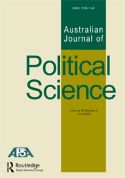Is uncivil disobedience ‘phenomenologically accurate’ and ‘politically useful’? Reflections on uncivil disobedience based on the 2019 Hong Kong Protests
Is uncivil disobedience ‘phenomenologically accurate’ and ‘politically useful’? Reflections on uncivil disobedience based on the 2019 Hong Kong Protests
- Jong-Won Lee
- Publication Date
August 2024 - Website
- View Publication Information
Highlighting the theoretical flaws inherent in the civil disobedience paradigm, a group of researchers, including Delmas, have recently proposed uncivil disobedience as ‘phenomenologically accurate’ and ‘politically useful’. This study challenges these claims by demonstrating that uncivil disobedience relies on a narrow interpretation of civil disobedience and vague definitions of its elements. Furthermore, it potentially risks sacrificing the political usefulness that civil disobedients could acquire. Instead, Scheuerman’s attempt to expand the civil disobedience is a better theoretical direction as it encompasses multiple dimensions of citizenship, beyond rigid normative attitudes. The approach is also more politically useful, as demonstrated through the case of the 2019 Hong Kong protests, which have erroneously been categorised as uncivil disobedience. This study contributes to the field by affirming that the civil disobedience remains a valid tool for analysing contemporary political phenomena. Finally, it argues for the conceptual systemisation of uncivil disobedience to enhance its analytical utility.
 The College of Arts
The College of Arts